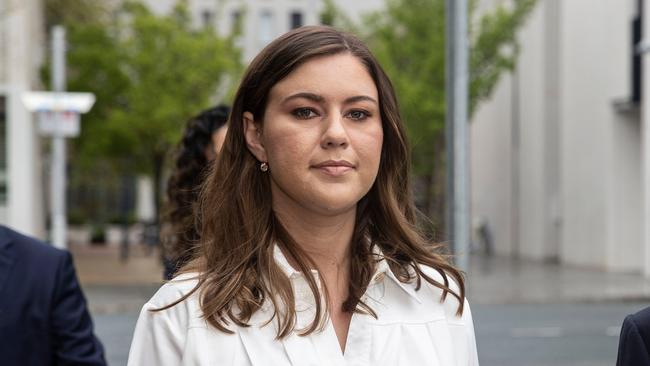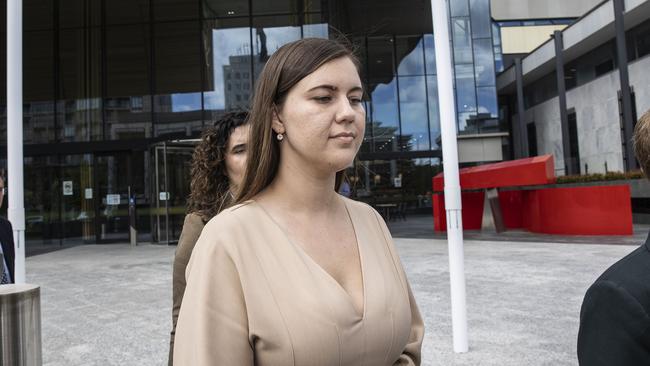It's never as simple as 'why didn't she tell the cops'
Women on a night out now not only need to carry their keys between their fingers, but also basic legal advice in their handbags too.

Women on a night out now not only need to carry their keys between their fingers, but also basic legal advice in their handbags too.
This is an opinion piece.
“Why didn’t she go to the cops?”
It’s one question that is raised whenever a story regarding sexual assault makes the news. It has been one of the most common when the Bruce Lehrmann rape trial is discussed between friends and peers.

Rape is terrifying. Reporting rape is traumatic, cold, clinical and invasive. And that’s even before she “goes to the cops”.
A rape kit is usually administered by a doctor before a victim even considers making an official complaint to authorities.
It’s not just a woman’s account of what happened which can be used by police and then potentially in a courtroom. A “strong” case is built on swabs taken from the most private parts of a woman's body and her anatomy. Photographs are taken. Lacerations are inspected under bright lights. Her sexual history is recorded and her clothing and underwear are examined - ideally hours after the incident.
Timing and record keeping is everything when you’ve been violated in the worst way imaginable.
Results from toxicology tests, STD screenings, traces of partners DNA and determining if a victim is pregnant are all a part of a "good" prosecution.
And this all happens before she utters the words “I was raped” to a police officer.
The most recent statistics from the Australian Bureau of Statistics show 97 per cent of sexual predators are male. Of all the rape cases heard in criminal courts that conclude with a ruling, just 1.5 per cent end in a conviction.
It’s a fact that many women, especially young women, know.
Recently The Oz reported the incoming SRC at the prestigious University of Sydney is looking to shut down student accommodation due to the high rates of sexual assaults occurring in the privately run lodgings.The National Student Safety Survey published stats this year that showed 67 per cent of students had been sexually harassed since starting uni.
These findings are also reflected in recent government documents from the Jenkins review to the new Budget, that highlights OECD research which shows the gender safety gap in Australia is widening, with more women feeling less safe to walk home alone at night than men.
There is a reason rape victims are called survivors.
Sexual assault is not just an abuse of flesh. In the minutes, hours, days and in Higgins’ case, years following, it repeats over and over again all the name of “evidence” and insurance should a woman pursue justice.

Brittany Higgins was 25 when she was allegedly raped on a couch in her boss’ office inside the country’s most important building, Parliament House. Higgins said it was here, inside this beacon of Australian democracy, where she - as a young, junior government staffer - lost her “dignity”.
One of the pillars of the defence in the high profile trial was the timeline of Higgins’ complaint.
And the fact she went public before going to the police.
She told media outlets in February 2021 that in March 2019 she “woke up mid-rape essentially” on a couch in the office of then defence industry minister Linda Reynolds sometime after security guards had let Higgins and the accused into the building.
After going public, Higgins made a formal complaint to police and called for the perpetrator to “face the full force of the law”. She said she spoke out before speaking to authorities due to her case being covered in a murky layer of politics and power imbalances.
Lehrmann, 27, pleaded not guilty to having sexual intercourse with Higgins without her consent and being reckless as to whether she had consented.

Lehrmann has always denied that any sexual activity took place at all.
He was not asked any questions during the trial.
Higgins was cross examined for days.
Her credibility, her morality, her memory and her underwear were all scrutinised.
She claimed she made numerous doctor’s appointments but didn’t attend as she was unable to get out of bed.
Barrister Steven Whybrow put to her she did not visit a doctor in the days after the alleged rape because it didn’t happen.
“The reason you didn’t go to a doctor is because you hadn’t had sex with anybody on the Friday night, consensual or otherwise,” Whybrow suggested.
Higgins said that was not true and said the reason she didn’t disclose the alleged assault immediately was because “it took me more than three days to process my rape”.
She was “passed out on Valium” when her story was shared by her boyfriend with the media.
She was quizzed about her knickers and why her stories to the media didn’t align. She explained in front of court she was, and remains, “embarrassed” that she did not wear underwear under her dress on the night of the alleged rape.
She admitted to having misled The Project’s Lisa Wilkinson during a conversation that was also read out in court, in which Wilkinson asked if Lehrmann had “removed your panties” and Higgins had responded “yeah”.
Higgins said it was just a conversation where she was trying to “feel out” Wilkinson and that she had omitted the fact out of embarrassment.
“I’m embarrassed by it. I continue to be embarrassed by it and I’m now embarrassed by it in front of the court,” she said.
“He had taken my dress off my body. He could not take my underwear because I wasn’t wearing underwear. I was only wearing a bra.”
The government has this week committed $83.5m to teach young people about “healthy relationships” and about preventative issues like consent.
During the trial, which was discharged on Thursday, Justice Lucy McCallum told the jury there is no right way to respond following sexual assault. However, following the hard lessons and cold truths which have emerged out of this sorry saga, young women now not only feel they should carry their keys in between their fingers, but they should have basic legal advice in their heads on a night out too.
“Go to the cops” is just one step, building up the courage to do so is the most important part.
If you need help please contact 1800 RESPECT.


